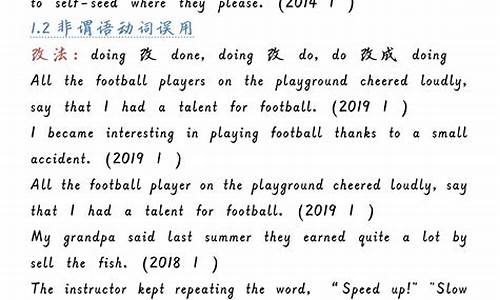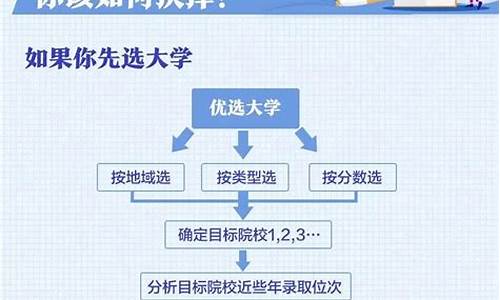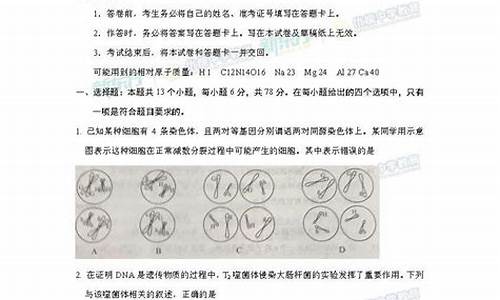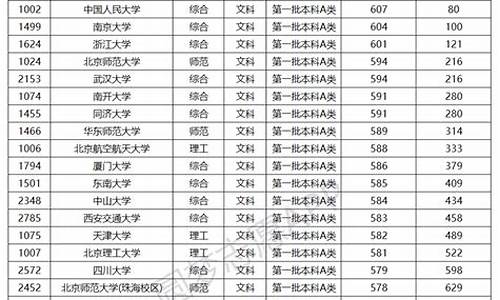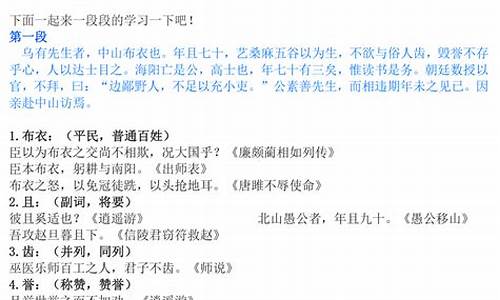您现在的位置是: 首页 > 招生信息 招生信息
高考英语云南2017答案-高考英语云南2020
tamoadmin 2024-10-26 人已围观
简介1.2017全国卷三英语完型难吗2.高考英语阅读理解训练3.2017年高考英语备考:地点副词的用法4.2017高考英语2卷改错的问题?2017全国卷三英语完型难吗完型主要看三项:看文章技巧,做题方法,以及如何提高准度与速度。做完形填空时一定要先看文章后做题,我对猜选项这种娱乐方式乐此不疲,“合契若一”之时,那种自得着实莫可言说!做完后可适当再看一遍,有时连贯起来会发现理解错误。2017全国卷3高考
1.2017全国卷三英语完型难吗
2.高考英语阅读理解训练
3.2017年高考英语备考:地点副词的用法
4.2017高考英语2卷改错的问题?
2017全国卷三英语完型难吗
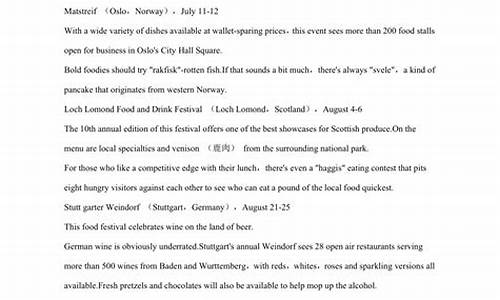
完型主要看三项:看文章技巧,做题方法,以及如何提高准度与速度。做完形填空时一定要先看文章后做题,我对猜选项这种娱乐方式乐此不疲,“合契若一”之时,那种自得着实莫可言说!做完后可适当再看一遍,有时连贯起来会发现理解错误。
2017全国卷3高考英语完形填空答题套路
英语完形填空答题套路:
完形解题包括两个方面:一方面是读懂文章,另一方面是选对选项。读懂文章考查的是理解能力,选对选项则考查的是写作中遣词造句的能力。在解题时要把这两种能力综合运用。要读懂文章,首先要把握文章的体裁。比如记叙文,要把握文章的故事线和情感线,尤其关注转折点。比如说明文,要明确作者的思路。选对选项,要牢记选择"最佳"。完形的答案或许两个都对,但肯定有一个更好。根据上下文的线索,加上对词义的辨析、考虑固定搭配,选择最佳选项。
完形填空的选项词中如果有生词的,要优先巩固记忆。可以筛查历年真题和近两年一二模题中的选项词,单独摘录出来优先记熟。一般来说,完形高频词的数量在1000左右,远低于考纲词的数量。对于其中一词多义、动介词组的情况,也要多加注意,尤其是要拿高分的同学。
以上《2017全国卷3高考英语完形填空分值及答题套路 万能解题方法技巧与公式模板》由高三网小编整理。学好英语,其实并不难,基础题目能弄会,弄透,能快速准确地落到卷面上,就有120分的希望。英语稳住这个成绩,就不会给整个高考拉后腿。
高考英语阅读理解训练
高考英语阅读理解精品训练2017
近几年高考英语阅读主要有猜测词义、理解主旨大意、推理判断、对文章的细节理解、 数据推算等几种题型。为了帮助大家备考高考英语阅读理解题,我分享了一些高考英语阅读理解练习,希望能对大家有所帮助!
阅读理解练习1
Not many years ago, a wealthy and rather strange old man named Johnson lived alone in a village in the south of England. He had made a lot of money in trading with foreign countries. When he was seventy?five, he gave ? 12,000 to the village school to buy land and equipment (设备) for a children?s playground.
As a result of his kindness, many people came to visit him. Among them was a newspaperman. During their talk, Johnson remarked that he was seventy-five and expected to live to be a hundred. The newspaperman asked him how he managed to be healthy at seventy?five. Johnson had a sense of humour (幽默). He liked whisky (威士忌酒) and drank some each day. ?I have an injection (注射) in my neck each evening.?he told the newspaperman, thinking of his evening glass of whisky.
The newspaperman did not understand what Johnson meant. In his newspaper he reported that Johnson was seventy?five and had a daily injection in his neck. Within a week Johnson received thousands of letters from all over Britain, asking him for the secret of his daily injection.
1. Johnson became a rich man through
A. doing business. B. making whisky. C. cheating. D. buying and selling land.
2. The gift of money to the school suggests that Johnson
A. had no children. B. was a strange man.
C. was very fond of children. D. wanted people to know how rich he was.
3. Many people wrote to Johnson to find out
A. what kind of whisky he had. B. how to live longer.
C. how to become wealthy. D. in which part of the neck to have an injection.
4. The newspaperman
A. should have reported what Johnson had told him.
B. shouldn?t have asked Johnson what injection he had.
C. was eager to live a long life.
D. should have found out what Johnson really meant.
5. When Johnson said he had an injection in his neck each evening, he really meant that
A. he liked drinking a glass of whisky in the evening.
B. he needed an injection in the neck.
C. a daily injection in the evening would make him sleep well.
D. there was something wrong with his neck.
阅读理解练习2?I?m very tired from working here,?said Jean to her friend Kate,? I?m on my feet from morning to night. For the first quarter of the day, I clean up the counter (柜台) and set the tables. For the next quarter, I help in the kitchen. For the second half of my workday, I take orders at the counters.?
?Kate, I wish I had your job,?Jean went on. ?For four hours you just sit at the cash register (收款台) taking in money.?
?But I spend two more hours in the kitchen (厨房) than you do,?said Kate. ?It?s tiring to cook over a hot stove. I don?t think you?d really want my job. In fact, I?d like your job.?
1. Both Jean and Kate probably work in a
A. hotel B. library C. lab D. shop
2. How long did they work every day?
A. eight hours B. twelve hours. C. Ten hours D. Nine hours
3. How long did Kate spend in the kitchen?
A. a quarter day. B. A half day. C. One-third day. D. Three-fourths day.
4. From this passage we can see that
A. they are both interested in their work. B. their work is neither tiring nor busy.
C. both of them are tired of their work. D. they?ve decided to give up their work.
5. Give a proper proverb (谚语) to Jean and Kate.
A. It?s never too late to learn.
B. It?s no use crying over spilt milk.
C. The grass is always greener on the other side.
D. One swallow(燕子) does not make a summer.
阅读理解练习3In 1985 a French television company sent its reporters to the Paris Metro. They took cameras to see what passengers would do if they saw someone attached on the platform or in the trains. They acted out incidents. The incidents looked real but they were all done with the help of actors. However, very few people tried to help, and most passengers pretended not to notice. in one incident, a foreigner was attacked by three men. The attack was on a train which was quite full, and although one man tried to get the passengers to help, they all refused. It seems that such behaviour(行为) is not unusual, but the question is why? Is it a problem of big cities, or would the same thing happen anywhere? To discuss these questions, we have in the studio(演播室) Professor Wilson, who is an expert on the subject?
1. Who did the experiment?
A. A French television company. B. The Paris Metro.
C. The City Government of Paris. D. Professor Wilson.
2. What did the experiment try to find out?
A. How a foreigner was attacked on the train.
B. How passengers helped each other on the platform.
C. Passengers? reactions towards incidents.
D. Actors? performances during incidents.
3. What was the finding of the experiment?
A. Passengers helped a lot during incidents.
B. Very few foreigners were on the train.
C. Very few passengers tried to help during incidents.
D. Some people were good at acting on the train.
4. Who do the underlined words one man refer to?
A. One of the three men who attacked a foreigner.
B. One of the actors who took part in the experiment.
C. One of the passengers who were on the train.
D. One of the reporters who were sent to the Paris Metro.
参考答案:
1A 2 C 3 D 4 D 5 A
1A 2 A 3 B 4 C 5 C
1D 2 C 3 C 4 B
;2017年高考英语备考:地点副词的用法
地点副词
具体如下:
地点副词指表示地点的副词和表示位置关系的副词统称为地点副词.常见的这类副词有:
表示地点的:
here,there,home,upstairs,downstairs,anywhere,everywhere,nowhere,somewhere,abroad,elsewhere等.
表示位置关系的:
above,below,down,up,out,in,across,back,along,over,round,around,away,near,off,on,inside,outside,past等.
在表示位置关系的副词中,有些副词也可用作介词(如:
above,over,beyond,around,below,down,up,in,along,near,off,on,past等),在没有宾语时就是副词,有宾语时就是介词,如:
Come in,please.(副词)
They live in the next room.(介词)
Let's take along.(副词)
Let's walk along this street.(介词)
She looked around.(副词)
They sat around the table.(介词)
Let's go on with the work...(副词)
What subject will you speak on?(介词)
四、地点副词在句中的位置
地点副词常放在动词后面,如果是及物动词,一般就放在宾语后面.如:I remember having seen him somewhere.
Wuxia films are popular in China.
地点副词和时间副词并列使用时,一般要把地点副词放在时间副词之前.如:
We had a meeting here yesterday.
He did the work carefully here yesterday.
如果地点状语很长时,也可以放在时间状语之后.如:
He was born in 1940 in a small village at the foot of Mount Tai.
五、地点副词常可以用作表语
副词可以用作表语,主要是地点副词,时间副词和其他副词有时也可以用作表语.如:
They are inside.他们在里面.
How long will she be away?她要离开多久?
When will you be back?你什么时候回来?
You haven't been around much.你很少到这边来.
He'll be round in an hour.他一个小时内就到.
Now autumn is in.秋天来了.
I must be off now.我得走了.
We are behind in our plan.我们落在计划后面了.
2017高考英语2卷改错的问题?
第一个的话我觉得and也行,and是和的意思,可以表示对等,我觉得有时候也是引出补充说明句子,so吧也可以,主要是前后因果关系不是很强烈,住得远并不一定是要花1.5个小时到学校,住得远的果应该是上班路上时间长逻辑才算通顺,这是可改可不改的。
第二个,我认同你的说法,逗号后面是非限制性定语从句,要用which,不过前面interesting错的也很明显,感觉题出错了。
